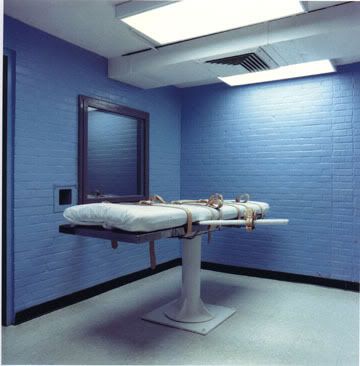Great news. A California Court of Appeal has invalidated California’s lethal injection protocol because the state failed to comply with the state’s Administrative Procedure Act. The decision(pdf format) in Morales v. California Department of Corrections and Rehabilitation, holds that the State’ lethal injection protocol, “STATE OF CALIFORNIA SAN QUENTIN OPERATIONAL PROCEDURE NUMBER 0-770 EXECUTION BY LETHAL INJECTION, is invalid and it enjoins California “from carrying out the lethal injection of any condemned inmates under OP 770 unless and until that protocol is promulgated in compliance with the APA.”
The more than 660 prisoners on California’s death row should briefly sigh some relief. There is little doubt that the regulation will be re-enacted, but the struggle against state killing in California goes on, and today’s ruling is a great victory.
The Mercury News reports:
A state appeals court on Friday ensured further delays in California’s already inert death penalty system, finding that Gov. Arnold Schwarzenegger’s administration did not follow proper procedures when it attempted to revise the state’s lethal injection method to get executions back on track.
In a 14-page ruling, the San Francisco-based 1st District Court of Appeal upheld last year’s decision by a Marin County judge, who found state officials failed to provide public scrutiny of plans to overhaul California’s execution method. The appeals court ruling, if it stands, would force the state to go back to the drawing board in its efforts to bring the execution system into compliance with a federal judge’s concerns that the current method is unconstitutional.
The appeals court ruling will have a ripple effect on California’s bogged down capital punishment system. A broader legal challenge in federal court to California’s lethal injection method cannot move forward until the state comes up with a revised procedure, and that is now tied up further as a result of the appeals court’s findings.
Senior Assistant Attorney General Ronald Matthias, who supervises the state’s death penalty cases, was still reviewing the decision and could not predict the next step. But the state can either appeal to the California Supreme Court or move forward with public review of the proposed lethal injection reforms, and either process would take months or longer.
Executions in California have been on hold for more than 3 years because of challenges to the state’s lethal injection protocols. The 2006 Judge Fogel stopped all California executions, but provided a number of steps state officials could take to ensure that executions were carried out humanely. The governor then ordered state prison officials to come up with a new plan. The plan called for improved training and supervision of execution team members, as well as the construction of a new, modernized execution chamber. But plan was challenged in state court under the argument it violated state procedures that require public review, and Fogel put the federal case on hold until that issue was resolved.
Is the issue resolved now? No. The state can either try to adopt a new protocol, following the law, or it can appeal. Either way, state killing cannot resume until the issues are resolved.
I applaud today’s ruling, and I compliment all of the people who have worked so diligently to stop state killing in California.


